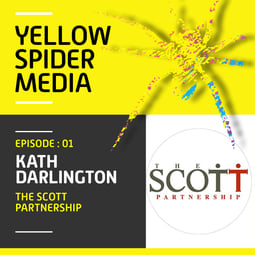We took part in a new business spotlight podcast hosted by Yellow Spider Media to talk about how the past year has changed communications in specialised markets.
Our CEO, Kath Darlington, speaks to John Storton, from Yellow Spider Media about starting up a business, what running a communications agency has been like over the past 12 months and the importance of digital marketing today. Listen to the podcast in full above, via Spotify or Apple Podcasts or read a summary of the conversation below.

Can you explain what The Scott Partnership does?
We are a business-to-business marketing and PR agency. We’re a global company focused on delivering our services to organisations in life sciences, which is very specialist in marketing terms. Originally, when we set up the business, our service provision was entirely PR and content which is still a large part of our business. We also work extensively in marcoms and social, helping clients to support their digital funnel. Our third area of business is customer voice, where we work directly with scientists to interview them about their experience of how they use technology to forward their scientific research.
Why did you decide to work with scientific clients?
Our original portfolio of clients included science and non-science companies. At the time, it was really clear that there were huge challenges for other agencies trying to get into scientific marketing. There’s a big terminology barrier with understanding the language of science, so we specialised very quickly in that area. We found ourselves servicing global markets with industries that were almost recession-proof.
Having a specialism gives focus and getting to know your industry is priceless, isn’t it?
Exactly, we work as a business in markets that are huge. That being said, the market for scientific marketing is small, many people know each other, even though it’s a global industry. I like to say that we’re probably the world’s most specialist agency with experience in mass spectrometry, for example. To a non-scientist, that would mean absolutely nothing but to a scientist, it will tell you exactly what we do.
How have the last 12 months been for you as a business?
We navigated 2020, and any business that has come through a year like that should be proud of themselves. We are very lucky. Whole industries have been wiped out; it’s been terrible. The short answer is, it was a positive year for us, a sort of explosion in opportunity. It had its negatives; managing teams who are all accustomed to working together in partnership and very collaboratively from a distance requires change.
Have you seen businesses getting more used to being online? Has anything changed in your digital offering for clients?
Yes, there has been an overnight shift in what people can do to achieve success for their brand. Ultimately, we have a responsibility to ensure that our clients don’t spend money on things that don’t work for them. You have to ensure that they are getting the best return on investment that they can. A lot of expenditure has been cut from client’s budgets, and in the scientific community, word of mouth and peer recommendations are huge. There is a very large industry for conferences, trade shows, face to face presentations, where you are presenting science to other scientists, and that has had to be replaced. It goes without saying that social media and other digital tactics have had a huge role to play in all of that.
You mentioned social media, which platforms in which areas have worked well for you?
Currently, there are really two platforms that matter, maybe three. LinkedIn is used by about 45% of the industry, which sounds like a low percentage, but in science, a lot of people don’t use social media. For the 45% who are on LinkedIn, there’s probably 40%, who use no platforms whatsoever. Secondly, there is YouTube, which is a good platform for people to share content, and particularly to present this sort of peer content that we see so much of in science. YouTube is a back runner, about 10% of scientists are using it. Twitter is the third. It’s simply an amplification tool, particularly for people who look at social media channels as a way of self-publishing. Ultimately buyers’ prospects are always looking for the best solution, not just the solution they know.
Is there any business advice that you remember receiving that’s helped you in your career?
Firstly, be fearless. Work is a third of your life and for most people, it exists to fund the rest of their life. If you’re starting a business, go for it because you have that one opportunity and it can transform everything that you can do going forward, not just for yourself, but for all the people whose lives you touch.
——————
The Scott Partnership would like to thank John Storton for giving us the opportunity to talk about the business. Find out more information on the services that Yellow Spider Media provides, check out its LinkedIn, Twitter and Facebook.
The Scott Partnership provides support to global businesses operating in life science and can help you to penetrate global and local markets, including China and North America via our international footprint. Please contact us to hear more about the services that we provide.





